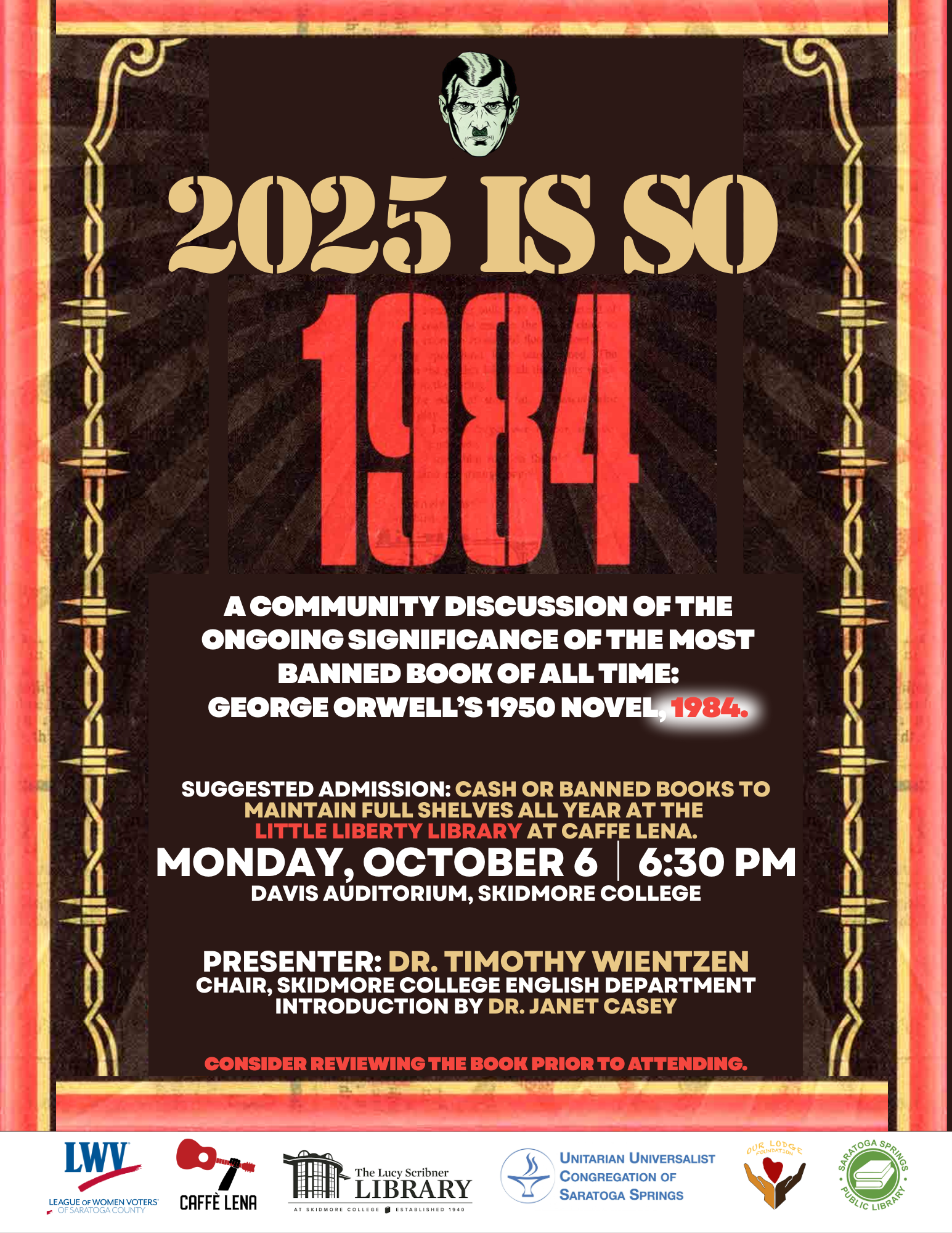REVIEW: Skidmore College and Caffe Lena Kick Off Banned Books Week with 2025 is so 1984
10/6 @ Davis Auditorium, Skidmore College
“so long as the undercurrent of the counterculture runs through the people, the potential to endure and overcome will remain.”
They say if you want to read a good book, you should pick one from the extensive selection of literature that you’ll find on the infamous banned books list. Surely any body of work that winds up the establishment enough that they attempt to purge it from shelves holds important reflections about society, whether that’s a critique, satire, or cautionary tale. This is absolutely the case with George Orwell’s classic anti-authoritarian novel 1984, on which Skidmore College and Caffè Lena teamed up to host a discussion this past Monday evening, celebrating the start of Banned Books Week. The Banned Books Week initiative was launched in 1982 in response to a sudden surge in the number of challenges to books in libraries, bookstores, and schools.
The event was sponsored by the local chapter of the League of Women Voters, and opening remarks were delivered by Caffè Lena Executive Director Sarah Craig as well as Dr. Janet Casey. Craig spoke on the origins and importance of the community supporting access to banned books in the Saratoga area, noting their contribution via Caffè Lena’s Little Liberty Library (which received suggested donations of both cash and banned books during the event). Dr. Casey spoke of her expertise on controversial and leftist literature, and went into detail on the origins of book banning as a method to combat what was then thought of as “communist propaganda.” She noted that, while at one time these bans were perpetrated mostly by government figures, today the fight to ban books often gets carried out by parents under the guise of “protecting children,” deeply impacting public schools in some areas of the United States.
Dr. Timothy Wientzen, chair of the Skidmore English department, took the podium next to serve in his role as the main facilitator of the evening’s discussion on Orwell’s work. He holds experience with James Joyce and Virginia Woolf as well as his current project analyzing Aldous Huxley’s Brave New World. He maintained that Brave New World is another side of the same coin as 1984 when it comes to the genre of dystopian fiction, something he said did not really exist until the 1920s and reached its peak popularity in the 1950s. Wiemtzen teaches 1984 as part of a class on fascism, and while the source material’s relationship to contemporary issues is complicated, there are parallels to be drawn. As he turned it over to the crowd that filled Davis Auditorium, it quickly became clear that many in attendance were more than prepared to discuss those parallels passionately.
Photo by James Mullen
For the next hour, community members engaged in a lively discussion linking the themes of the novel with the situation facing the United States right this moment, as National Guard troops engage American cities in a political standoff that will soon reach its boiling point and has sent many rational people scrambling to sound the alarm about the beginnings of authoritarianism. Concerned citizens drew connections to the way the truth is handled in the book, pointing to the infamous line “2+2=5” to illustrate that within the novel, truth simply becomes whatever is continuously repeated by the powers that be until anyone who disagrees or remembers something else begins to doubt their own memory.
The conversation touched on the role of institutions, including the media, in shaping public perception and the importance of critical thinking in an age of misinformation. Of course, no discussion of 1984 would be complete without talking about the impact and potential of the role of surveillance in modern society. Many were concerned about the misuse of tools like AI for political purposes, and one speaker noted that –with the level of technology the average American carries daily– it would not take much for surveillance to pervade every aspect of life.
Ultimately, though, there was another vital and potentially most essential parallel between the novel and the current political landscape: a glimmer of hope. Many in the room were engaged in local activism, and made note of the effectiveness of recent protests in mobilizing community resistance. They said that these protests, notably ones against ICE in places like Ballston Spa, have received a surprisingly positive reception. The crowd seemed at a consensus, emphasizing the need for continued activism.
Dr. Wientzen noted that, in the epilogue, the language used shifts into a new perspective. “It says ‘Newspeak was the official language of Ingsoc.’ Not that it is, and this change to a past tense can be seen as a clue that this was not permanent, and by the time the novel was written the authoritarian regime had fallen.” Let that parting perspective be the legacy of 1984: so long as the undercurrent of the counterculture runs through the people, the potential to endure and overcome will remain.


